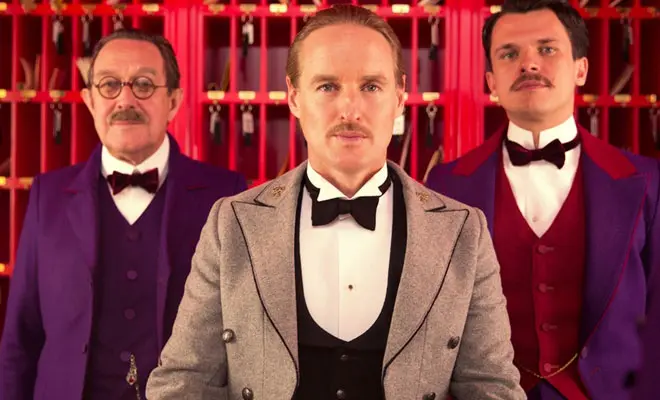Set in the fictional Republic of Zubrowka, Wes Anderson’s The Grand Budapest Hotel is a story within a story within a story within a story. The first takes place in present day and bookends the feature, two small segments where a young girl, carrying a book, is visiting the grave of Zubrowka’s “national treasure.” The “treasure” is a novelist whose name is never revealed and the book is The Grand Budapest Hotel.
It is here we flash back to 1985 to meet the author (played by Tom Wilkinson) who briefly explains how the book came to be. Flashback two takes us back to 1968, where the younger novelist (Jude Law) is visiting the famous hotel and comes across Mr. Moustafa (F. Murray Abraham) who just so happens to have the story that will become the author’s book.
Over dinner, Mr. Moustafa recounts the time he was a lobby boy at the Grand Budapest (flashback three to the mid-1930s) and the legendary European concierge Gustave H (Ralph Fiennes). Gustave lorded over the hotel between the wars, taking care of the guests with the utmost professionalism, in some cases even beyond that. How so? Let’s just say that Gustave went the “extra mile” for many of the older women staying at the hotel, among them Madame D. (Tilda Swinton). It’s at this time that Gustave also makes Zero (played as a young adult by Tony Revolori), his young protege.
For a while all is, well… grand… at the Budapest for the duo. But when Madame D. is found murdered and Gustave is left a valuable Renaissance painting in her will, the Concierge is accused by Dimitri (Adrien Brody), the Madame’s slimy son, of committing the crime. It’s up to Zero to help his mentor get out of jail and discover who is really behind the crime.
Like many of you, I have been a fan of Wes Anderson’s work ever since his remarkable second feature, 1998’s Rushmore. 1996’s Bottle Rocket was a decent-enough debut, but it was the filmmaker’s sophomore effort that really established his signature style: worlds that exist between the real and surreal, the meticulous screen compositions, camerawork and color schemes, the inimitable characters and their smart, dryly hilarious and at times heartbreakingly honest dialogue. His work isn’t for all tastes, but it’s hard to deny that his movies are a genre unto themselves.
The Grand Budapest Hotel presents Anderson not only at his most whimsical and melancholy; it may also be his most self-referential and introspective as well. There are plenty of visual flourishes and references to Anderson’s previous works in Hotel. The frenzied pacing of the second half of the film and wonderful use of miniatures brings to mind 2009’s Fantastic Mr. Fox. The fanciful, snow globe-esque European setting brings to mind the isolated island town of Moonrise Kingdom and the Salinger-esque New York of The Royal Tenenbaums, and the world-bridging friendship between Gustave and Zero is reminiscent to Max Fischer and Herman Blume’s (minus the shared love interest) from Rushmore.
Yet it’s the film’s sense of loss and uncertainty of the future that helps connect the viewer to the onscreen events and gives Budapest its dramatic weight. Nostalgic longing for happier times is a recurring theme in a Wes Anderson movie, one that started to become more prevalent in Fantastic Mr. Fox and Moonrise Kingdom. With the allusions to the ugly specters of war, fascism and communism and the dire consequences that come with them, the longing for a simpler, happier time and place — even in one that is 100% fictional — takes on more importance. The fact that the past is gone and isn’t coming back no matter how hard we try makes the efforts of Gustave and the adult Zero all the more bittersweet and relatable.
If the above makes The Grand Budapest Hotel sound like a bit of an esoteric downer, fear not. It is anything but. The movie is often darkly hilarious, a feat that should be credited to its sterling ensemble cast just as much as it can to Anderson. At the center of this wonderful ensemble is an award-worthy turn by Fiennes.
Ever since he stunned the world 21 years ago with his work in Schindler’s List, Fiennes has continued to impress with a wide range of roles in a number of genres. Comedy, however, hasn’t been one he has worked much in. Watching his deadpan, mannered performance as Gustave H. you would figure that he has done nothing but comedy for most of his career.
Fiennes’ comic timing is impeccable and the onscreen chemistry he has with Revolori, who excels as Zero, is first rate. The duo are backed by great turns from Brody, Willem DaFoe, Jeff Goldblum, Edward Norton, Abraham and Saoirse Ronan as the love of Zero’s life. They each deliver Anderson’s nuanced dialogue with great conviction and ease.
In a day and age where Hollywood increasingly depends on comic books, sequels and rehashes of familiar product to fill multiplexes, the works of Wes Anderson should be held in the highest regard. Time and again, Anderson’s movies offer up what all films should aspire to deliver: high entertainment value, wondrous originality and heart. It’s hard to say if The Grand Budapest Hotel is his best work to date, but it is easily the best film of 2014 so far.
High-Def Presentation
Presented in its multiple theatrical aspect ratios (1.37:1, 1.85:1 and 2.4:1) The Grand Budapest Hotel looks and sounds great on Blu-ray. Color is robust, black levels are deep and picture detail is excellent. It’s a flawless presentation that perfectly captures Robert Yoeman’s clever cinematography. On the audio front, the 5.1 DTS HD-Master Audio track is as clear as a bell. Center channel dialogue is pitch perfect as is Alexandre Desplat’s wonderful score, which is delivered with full force via the right and left front channels. Surround channel activity is discreetly handled. It’s another great presentation on Blu-ray from Fox Home Entertainment. Note: it does ask you to set your monitors to 16:9 before the film begins. One can only assume this is meant for the DVD edition.
Beyond the Feature
Being this is a non-Criterion release of a Wes Anderson feature, it comes as no surprise that the bonus material is on the lighter side. To Fox’s credit, at least they provided the viewer with something. Focus Features’ Blu-ray of Moonrise Kingdom had a whopping three to five minutes of bonus material. Should these two films follow the pattern of Anderson’s other features, we should see Criterion editions at some point in the near future with more extensive supplements.
- Bill Murray Tours the Town (4 mins): A nice little short that follows Wes Anderson’s longtime acting collaborator as he strolls through the town where a majority of the movie was shot.
- Vignettes (9 mins): Three short features that center around Tom Wilkinson’s character as well as the Society of Crossed Keys, the mysterious concierge cult that helps Gustave and Zero out in the movie.
- The Making of The Grand Budapest Hotel (18 minutes): A 4-part look at the making of the film.
- Wes Anderson (4 mins): The cast waxes poetic about their team leader, with a quick sound bite or two from the man himself.
- Cast (3:24): a look at the great ensemble cast.
- Theatrical Trailer (2:26): Thank you, Fox.
- Stills Gallery (3:25): Props from the film, which helps show the attention to detail Anderson gives to his productions.



